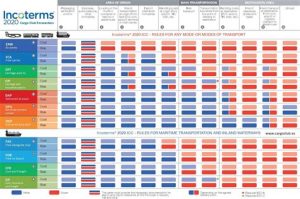Incoterms 2020 (International Commercial Terms)
Incoterms® 2020 are set of rules decided by ICC (International Chamber of Commerce) which are used to execute a trade.
Who (Buyer or Seller) will bear the various costs at various stages of a trade like packing, loading, shipping, clearing & forwarding, Transportation, Insurance, duty, THC etc. is decided by these incoterms.

There are 11 incoterms presented by ICC for 2020, which are described below:
We will start the INCOTERMS 2020 with
1)EXW (Ex-works)
In case of Ex-works shipments seller packs the cargo and keeps ready at their loading area, after that it’s buyer’s responsibility to complete the shipment. Buyer arrange to load the cargo, primary transportation, origin THC, freight etc. Once cargo arrives at POD, buyer clears the cargo and take the delivery.
2) FCA (Free carrier)
In case of FCA seller hands over the goods to carrier or to a buyer’s nominated person/company at seller’s premises or anther agreed place.
3) FAS (Free alongside ship)
In case of FAS sellers deliver the goods next to/ close to the vessel nominated by buyer at nominated port.
4) FOB (Free on Board)
In case of FOB shipments seller clears the cargo, load on vessel and onboard the vessel, after that it is buyer’s responsibility. In this case seller/exporter clears the cargo from customs and delivers the goods to the vessel at the port. All the charges till this point are on seller’s account. Buyer books the container, Insure the cargo & receive the cargo at POD. So Ocean freight, Insurance charge, handling charges at POD, import clearance charges & duty if any are in buyer’s/consignee’s account.
5) CFR (Cost and Freight)
In case of CFR shipments seller clears the cargo deliver at the vessel, Books containers & Pays freight after that it is buyer’s responsibility. In this case cost of cargo clearance at load port, Ocean freight charge, any export duties are on seller’s account. And handling charges at POD, import clearance charges & duty if any, Insurance charges are in buyer’s/consignee’s account.
6) CIF (Cost Insurance & Freight)
Incoterm 2020: CIF shipments seller clears the cargo deliver at the vessel, Books containers & Pays freight and Insure the cargo after that it is buyer’s responsibility. In this case cost of cargo clearance at load port, Ocean freight charge, any export duties, Insurance charges are on seller’s account. And handling charges at destination port, import clearance charges & duty if any are in buyer’s/consignee’s account.
7) CPT (Carriage paid to)
Incoterm 2020: CPT seller hands over the goods to carrier or a person/company nominated by seller at mutually agreed place.
8) CIP (Carriage & Insurance paid to)
In case of CIP Incoterm 2020, the seller hands over the goods to carrier or a person/company nominated by seller at mutually agreed place, in this case along with Insurance. This is similar to CPT, only change is seller arrange insurance in case of CIP. This is similar to CIF also, only difference is CIP is for all modes of transport & CIF is for sea mode.
9) DAP (Delivered at Place)
In case of DAP seller delivers the goods at buyer’s place ready for unload. Seller takes all responsibilities till goods are reached at buyer’s place, unloading is buyer’s responsibility.
10) INCOTERMS 2020 on DPU (Delivered at place unloaded)
This is new incoterm introduced in 2020 In case of DPU seller delivers the goods at buyer’s place unloaded. Seller takes all responsibilities till goods are unloaded at buyer’s place.
INCOTERMS 2020 being highlighted:
11) DDP (Delivery duty paid)
In case of DDP seller delivers the goods at buyer’s place or agreed place. In this case everything is seller’s responsibility including customs clearance at destination and import duty/ taxes.
Want to join our Ecosystem groups or start discussions? Join HERE OR Reddit community to discuss Logistics? Join HERE
Download a guide to the incoterms 2020 rules :
INCOTERMS® 2020 RULES
A Short Summary of Key Changes, Advantages and Disadvantages